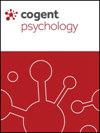The mediating role of self-compassion in the relationship between trait perfectionism and psychological resilience among Filipino university students
IF 1.6
Q2 PSYCHOLOGY, MULTIDISCIPLINARY
引用次数: 6
Abstract
Abstract Perfectionism has been a challenge in university students’ everyday lives. As perfectionism can negatively affect students’ mental health, researchers have suggested ways to manage perfectionism and build students’ resilience towards having a better wellbeing. One way is to practice self-compassion. This study utilized mediation analyses to investigate if self-compassion mediates the relationship between the trait dimensions of perfectionism and psychological resilience among Filipino university students. A sample of 317 undergraduate students from the University of the Philippines Diliman participated and answered scales that measure the variables of interest. Results indicate that when covariates were excluded, self-oriented perfectionism (SOP) and socially prescribed perfectionism influenced psychological resilience indirectly via self-compassion, while SOP and other-oriented perfectionism (OOP) directly affected psychological resilience, independent of self-compassion. When covariates were included, the same findings were found, but OOP also influenced psychological resilience indirectly via self-compassion. Implications of the findings are discussed in this study.自我同情在菲律宾大学生特质完美主义与心理弹性关系中的中介作用
本文章由计算机程序翻译,如有差异,请以英文原文为准。
求助全文
约1分钟内获得全文
求助全文
来源期刊

Cogent Psychology
PSYCHOLOGY, MULTIDISCIPLINARY-
CiteScore
2.90
自引率
0.00%
发文量
75
审稿时长
12 weeks
期刊介绍:
One of the largest multidisciplinary open access journals serving the psychology community, Cogent Psychology provides a home for scientifically sound peer-reviewed research. Part of Taylor & Francis / Routledge, the journal provides authors with fast peer review and publication and, through open access publishing, endeavours to help authors share their knowledge with the world. Cogent Psychology particularly encourages interdisciplinary studies and also accepts replication studies and negative results. Cogent Psychology covers a broad range of topics and welcomes submissions in all areas of psychology, ranging from social psychology to neuroscience, and everything in between. Led by Editor-in-Chief Professor Peter Walla of Webster Private University, Austria, and supported by an expert editorial team from institutions across the globe, Cogent Psychology provides our authors with comprehensive and quality peer review. Rather than accepting manuscripts based on their level of importance or impact, editors assess manuscripts objectively, accepting valid, scientific research with sound rigorous methodology. Article-level metrics let the research speak for itself.
 求助内容:
求助内容: 应助结果提醒方式:
应助结果提醒方式:


